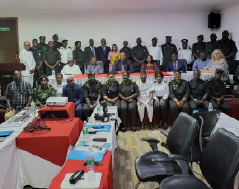
Organised by The Gambia Revenue Authority (GRA), the training was funded by the World Custom Organisation
In his opening statement, Yankuba Darboe, Commissioner General of GRA, explained that the rules of origin are generally the criteria used to determine the national source of a product.
“Their importance is derived from the fact that duties and restrictions in several cases depend upon the source of imports. The determination of the origin or source of a product in international trade is important for numerous reasons including and not limited to the application of the most-favoured nation treatment (MFN), but also for the implementation of a number of commercial policy measures such as anti-dumping and countervailing duties, trade embargoes, safeguard measures and quantitative restrictions or tariff quotas.”
Commissioner Darboe indicated that for the purposes of customs operations, it is important to distinguish between the types of origin i.e. preferential origin and non-preferential origin.
Preferential origin rules, he added, determines whether goods qualify as originating from certain countries, for which special arrangements and agreements apply.
“Where all the requirements are met, goods with preferential origin are eligible to be imported with lower duty rates or at zero rate, depending on the preferential tariff treatment provided. a very close example of preferential rules of origin is the ECOWAS Trade Liberalisation scheme (ETLS) where ECOWAS originating goods are accorded free duty, AU and ECOWAS levy in all ECOWAS member states.”
“The non-preferential rules of origin on the other hand are used to determine the country of origin of goods for the application of the most-favoured nation treatment (MFN) but also for the implementation of a number of commercial measures such as anti-dumping and countervailing duties, trade embargoes, safeguard measures and quantitative restrictions or tariff quotas.”




